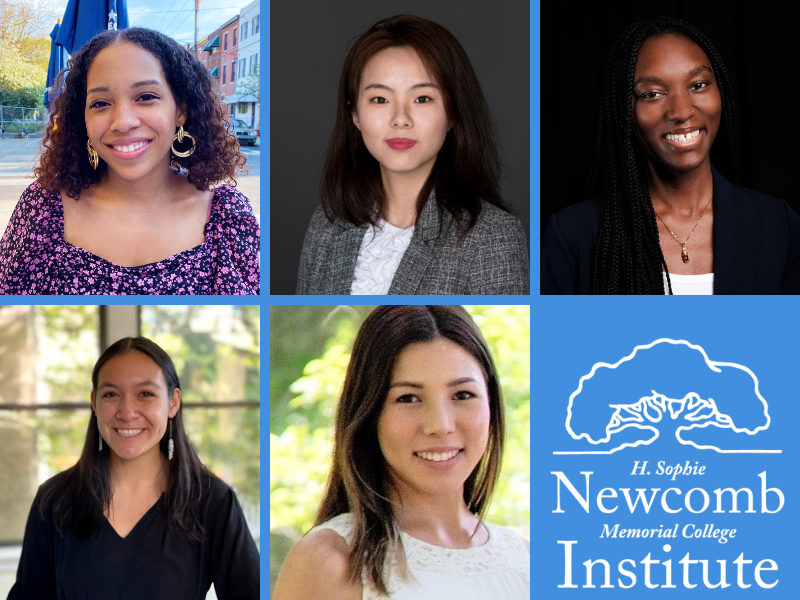By Jacquelyne Thoni Howard, Ph.D.

From left to right and top to bottom: Maya Angele Pelichet, Siyang Hu, Kila Moore, Adelaide Jasica, and Rebecca Roth
Since 2007, Newcomb Institute has supported undergraduates in gaining access to technology applications and building their technical expertise through its student programs and lab spaces. Since then, the technologies and professional practices used in technical fields such as computer science, digital media, digital humanities, digital design, and technology studies have evolved significantly. As the use of technology applications has become mainstream, questions have surfaced regarding how many of these work practices and algorithms have entrenched gender discrimination and racial bias, illuminating the lack of diversity and support that women and other marginalized groups face within these fields.
In response to our students’ growing need to stay current with new technologies and receive tangible work experience, Newcomb Institute has expanded its student program offerings. The Technology and Digital Humanities Lab supports gender equity initiatives in technology by building caring technology-focused communities for undergraduates. Keeping in mind that all fields are now technology fields, the Lab makes technology work and digital research more accessible and relevant for technical and non-technical majors through interdisciplinary collaboration with peers, faculty, and community partners. These programs encourage students to consider how their work connects with social and humanities-based research questions and affects their communities. The Lab continuously strives to build a supportive community where all students regardless of their background can contribute important perspectives while working on technical teams and building relationships with faculty and community members.
The Technology and Digital Humanities Lab at Newcomb Institute, managed by Dr. Jacquelyne Thoni Howard, houses four student programs and two student groups.
- The Digital Research Interns collaborate on an agile scrum team, modeled after the product development workflows across several technology fields. The student-led team works concurrently on a range of digital research projects for Tulane faculty, Newcomb Institute staff, and New Orleans community partners. Working on a scrum team helps students build a digital portfolio of authentic projects in a low-stakes work environment, develop relationships with students and mentors while working collaboratively, and learn skills such as digital media design, data analysis, computing, mapping, and digital archiving.
- The Information Technology Interns support the technology operations and infrastructure of Newcomb Institute. These students develop technical projects such as web and graphic design, and provide classroom and A/V support. This internship program will use an agile scrum model starting in the Spring of 2022 to encourage collaboration and mutual support among students.
- Grace Hopper Grantees attend the Grace Hopper Celebration each year, where they network with technology industry professionals, attend panels about gender equity in technology, and interview for jobs.
- The Gender and Technology Grantee receives a stipend to design and develop a technical project related to a gender topic. Newcomb Institute sponsors these grantees as they apply to the Humanities, Arts, Science and Technology Alliance and Collaboratory (HASTAC) Scholar program.
- The Equity in Technology (formerly Women in Technology-WIT) and theSociety of Women Engineers (SWE)student groups collaborate among peers to network with local STEM leaders, host workshops, and provide academic support.
These experiences provide students with mentorship from faculty and concrete work and networking experiences that supplement their academic work. These programs have impacted the outlook and careers of several Newcomb Alumnae working in various sectors.
Technology Zine
by Emily O’Connell (SSE ’22, SLA ’22)
Product Developer, Digital Research Internship Program
The Newcomb Technology Zine is a yearly publication comprising the work conducted by feminist-minded technologists who make up Newcomb Institute’s Technology and Digital Humanities Lab. These cohorts include the Digital Research Interns, the Information Technology Interns, the Grace Hopper Celebration grantees, the Gender and Tech grantees, and student groups. The zine examines the intersections of gender and technology. Interns share posters detailing their collaborative projects with project owners such as Tulane faculty, Newcomb Institute staff, and members of the Greater New Orleans community. Interns also develop interest articles exploring a unique facet of technology through a feminist-minded approach. Grace Hopper Celebration grantees reflect on their experience attending the various educational sessions and networking events at the conference. Additionally, the zine also provides a digital environment for the Gender and Tech grantee to publish a summary of their research project and findings. This synthesis of perspectives and experiences represents the multidisciplinary efforts of the tech cohorts and provides a space for reflection, discourse, and exchange regarding tech and gender issues.
Featured Alumnae
Rebecca Roth (SSE ’17)
Cybersecurity Operations Engineer, Dell Technologies
During my junior year, I was extremely fortunate to have been sponsored by Women in Tech (predecessor to Equity in Tech) and the Newcomb Institute to attend the Grace Hopper Conference for Women in Computing. By the end of the conference, I received a summer internship offer at Dell. I would not be where I am today without their confidence, support, and sponsorship. I believe that gender equity initiatives must disaggregate their data and take a more discerning look to identify underrepresentation. Not only do I expect a more serious focus on increasing the percentage for women in technical roles and leadership, but also for underrepresented women often measured only with respect to overall workforce diversity.
Maya Angele Pelichet (SSE ’18)
UX Designer at Microsoft
I very recently started working on a new team that works on a product called Microsoft Viva Connections. Viva Connections is a platform that helps inform, motivate, and engage employees. Before Viva Connections, I worked on Azure, Microsoft’s cloud platform, for two years. Outside of work, I cohost a podcast, The Designers Toolkit, to help those who are interested in becoming UX designers learn how to succeed in the industry. Newcomb Institute was extremely influential in impacting my values, helping me achieve my career goals and progressing quickly in my career. Equity in Technology taught me many things such as how to be a leader and how to mentor others, which are invaluable soft skills that I use daily. Being involved in Women in Tech (predecessor to Equity in Tech) also exposed me to opportunities such as the NI Collat Media internship. This internship allowed me to develop real work for my portfolio that I was able to use in interviews to get my first job out of college. In fact, I got my first job at the Grace Hopper Celebration of Women in Computer conference, which I was only able to attend because I received a scholarship I applied for through Newcomb. All in all, I attribute much of my early career success to Women in Technology and the many opportunities Newcomb Institute provided me.
Siyang Hu (SSE ’19)
Senior Data Scientist at PricewaterhouseCoopers (PwC)
Since graduating from Tulane, I’ve been a data scientist focusing on using machine learning and deep learning to solve problems in the Natural Language Processing domain. When clients come to me with needs or asks, I always start with understanding their business problems, and then I translate them into technical tasks. I was involved in the Newcomb Institute’s Digital Research program, where I explored my interests and capabilities in technology. As the project manager, I, along with my team, delivered various technology solutions to the clients, who are faculty and staff at Tulane. In addition, I was exposed to agile methodology that was widely used in software companies.
Adelaide Jasica (SSE ’20, PH ’20)
Business Data Analyst at Discover Financial Services
My role combines software projects and product management and helps define the processes with which my development team takes in requests, conducts our work, and handles releases of new functionality. This role brings together my technical background, communication skills, and management aspirations. Newcomb Institute’s technology Programming provided leadership and technical opportunities, which gave me the confidence to join the technology/software industry and to find a role that fits my values and interests. Newcomb’s programming mirrors the gender equity movement in the tech space by getting people in the door and supporting their growth in a safe-to-fail environment. Currently, I see the [gender equity in technology] movement pushing for intersectional equity across director and executive level positions as well.
Kila Moore (LA ’21)
Development Assistant at Son of a Saint
As the Development Assistant at Son of a Saint, I maintain an organized development operation, build new relationships and funding sources, and strengthen current relationships with donors, potential donors, and sponsors. Whether it is project management, database creation, research, or content development, my work with Newcomb prepared me to work within an environment that integrates social change and technological innovation. Gender equity in tech is more important now than ever. As we continue to learn and change the world around us, we will need initiatives like the Digital Research Internship to bridge the gap between the ever-advancing technological space and the ongoing journey towards an equitable future. I am immeasurably appreciative of Dr. Howard and the rest of my team for such an amazing experience.
